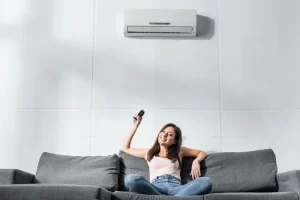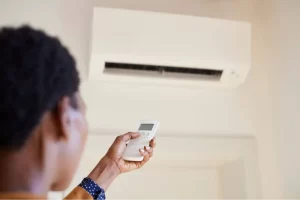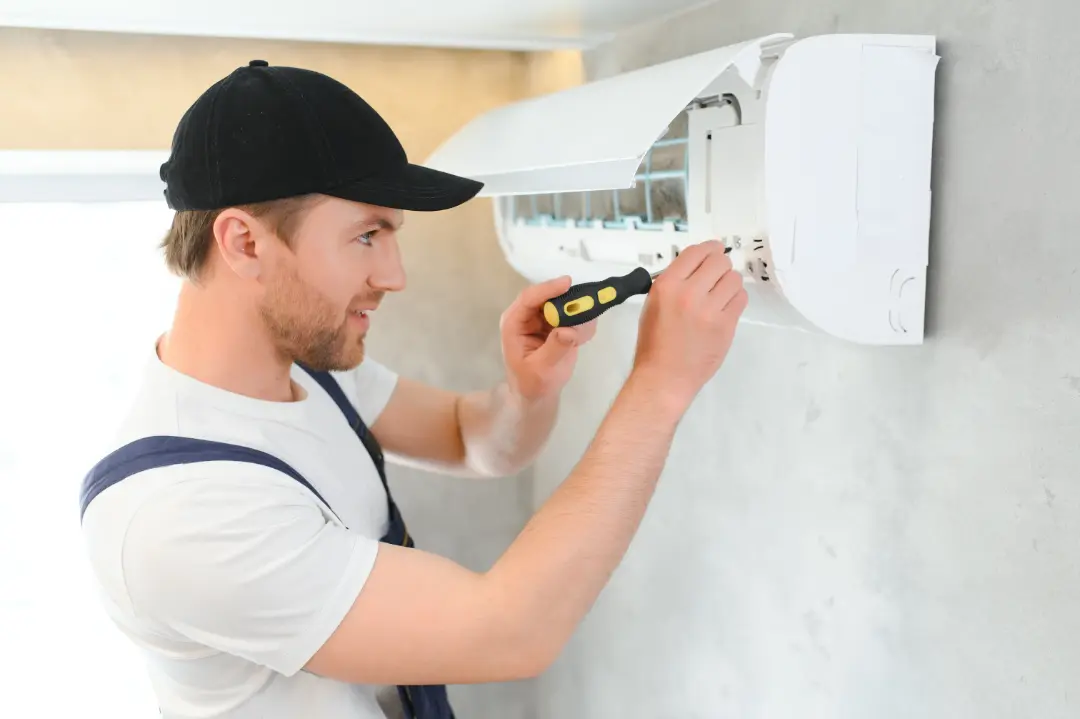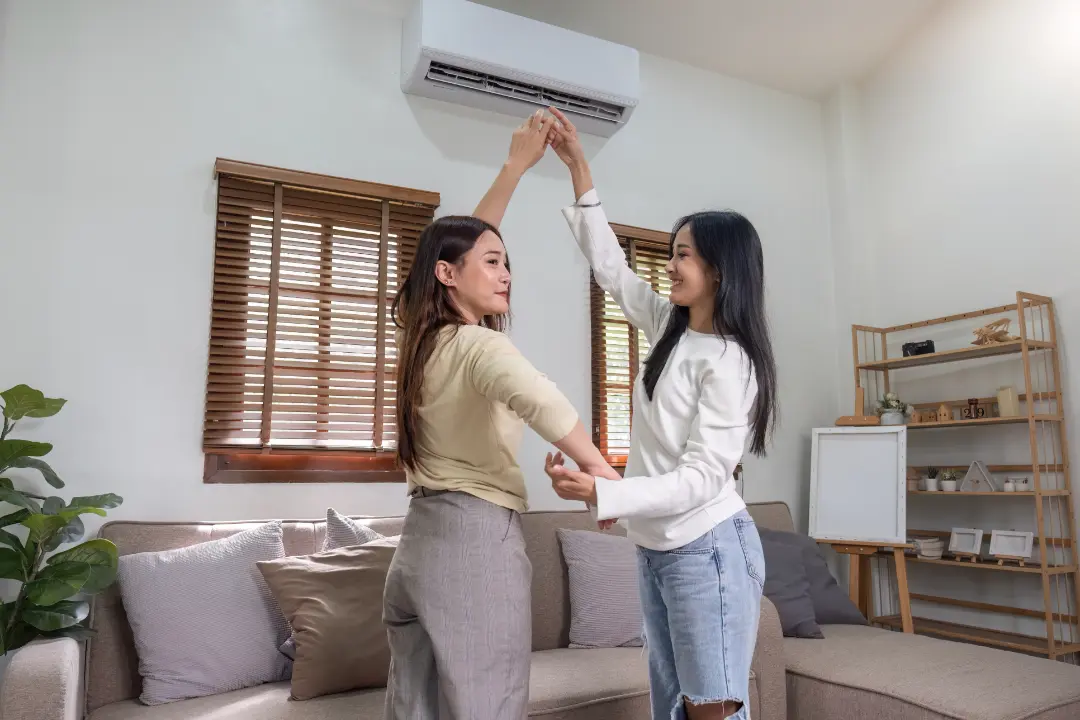As winter rolls in, it’s crucial to know what temperature to set the air conditioner in winter to ensure comfort without spiking your energy bill. The sweet spot? A snug 18-20 degrees Celsius. This guide will help you fine-tune your AC settings to your comfort level while considering energy efficiency. It will delve into the related aspects of energy consumption, maintenance tips, and Sydney-specific advice without overwhelming your system.

Key Takeaways
- The optimal air conditioning temperature for winter comfort and energy efficiency is between 18-20 degrees Celsius, with a 1-degree decrease potentially offering significant savings.
- Smartway Air Conditioning is a veteran Sydney-based company specialising in customised indoor comfort solutions using eco-friendly and advanced technologies. It is backed by a commitment to customer satisfaction.
- Regular maintenance and utilising smart features and modes on AC units can maximise energy efficiency and performance, while proper air conditioning settings contribute to both health benefits and cost savings.
Understanding the Ideal Air Conditioner Temperature in Winter
It might seem daunting to pinpoint the ideal air conditioning temperature for your air conditioner during winter. The ideal temperature range for comfort and energy conservation falls between 18 and 20 degrees Celsius. This range is not arbitrary; experts have honed in on it after countless studies and real-world experiences. It’s all about achieving a balance that keeps you snug without your air conditioning unit working overtime and driving up your energy bills.
Raising the temperature above 20 degrees might increase energy costs by 10%, while reducing it by merely one degree can result in significant savings.
The Balancing Act: Comfort vs. Energy Bills
Striking a balance between energy efficiency and comfort can feel like walking a tightrope. Stray too far in one direction, and your electricity bill skyrockets; lean too much the other way, and you’re shivering in your living room.
Setting your air conditioner to between 17 and 18 degrees Celsius is the most energy-efficient temperature in winter. However, the key is to personalise this range to your comfort level, as even a small adjustment can greatly affect your energy consumption and, consequently, your energy bills. When the mercury drops, resist the urge to crank up the warmth; instead, consider layering up and saving energy.
Factors Influencing Your Winter AC Settings
A variety of factors influence your optimal air conditioning temperature during winter. The climate of your region, the insulation quality of your home, and even your personal preferences play pivotal roles. In colder Australian areas, for instance, residents may need to set their air conditioning units between 21 to 22 degrees Celsius for adequate warmth.
Moreover, if your household includes babies, older people, or those who are unwell, you might need a warmer indoor environment to ensure their well-being. Enhancing your home’s insulation and sealing up any air leaks can work wonders in maintaining your desired temperature without overburdening your efficient air conditioning unit.
Smartway Air Conditioning’s Expertise in Winter Settings
Smartway Air Conditioning’s expertise is evident when adjusting your air conditioning for winter. With over 30 years of experience, this Sydney-based stalwart tailor indoor comfort solutions to suit the region’s unique winter conditions.
Whether you’re facing a cold snap or just the typical winter chill, Smartway has the knowledge and experience to ensure your home remains a haven of warmth and energy efficiency.
Why Trust Smartway with Your Winter Comfort?
Confidence in SmartWay Air Conditioning arises from:
- Their consistent quality and dependable service
- A team of certified technicians
- High service standards, particularly for renowned brands like LG air conditioners
- Their lifetime guarantee, which is a testament to their commitment to customer satisfaction
- Their focus on forging long-lasting relationships based on trust and quality
Operating across Sydney and its suburbs, SmartWay addresses a wide array of air conditioning needs with a customer-centric approach that has established them as a preferred provider in the industry.
Maximising Your Air Conditioner’s Energy Efficiency
Achieving energy efficiency with air conditioning might appear challenging, particularly during winter. However, it’s possible to keep your space comfortably warm without compromising efficiency. Regular inspections can catch issues early, preventing them from escalating into energy-guzzling problems.
Additionally, strategic measures like sealing drafts and cracks can keep the warmth and cold out, enhancing your air conditioner’s performance and reducing energy bills.
Regular Maintenance for Optimal Performance
Beyond sporadic check-ups, regular maintenance is fundamental to your air conditioner’s durability and efficiency. Smartway Air Conditioning emphasises the importance of regular care, from cleaning to replacing air filters. The frequency of these tasks can vary; while one-inch filters need monthly changes, five-inch filters have a longer life of around six months.
Such maintenance helps maintain optimal performance and energy savings, ensuring your system operates at its best when you need it most.
Smart Features and Modes for Energy Savings
In the digital age, air conditioning units have an arsenal of smart features designed to save energy. Modes like eco and sleep modulate the system’s output to match your needs, trimming your energy consumption without sacrificing comfort. Advanced features such as humidity sensors and geofencing capabilities enable your air conditioner to adjust temperature automatically, leading to further energy savings.
Smartway leads the way in using such advanced technology to offer efficient air conditioning services.

Achieving the Desired Temperature Without Overworking Your AC
Keeping your AC at the right temperature requires careful adjustment. Setting your air conditioner to the highest comfortable temperature recommended by the Department of Energy, 78 degrees, can help you avoid overworking the system. The ‘20-degree differential rule’ suggests setting your AC temperature no more than 20 degrees below the outside temperature to preserve its efficiency.
Additionally, ensuring proper airflow by keeping vents clear and interior doors open prevents mechanical failures and stress on the system. A well-balanced air distribution within your home is critical for consistent temperature regulation and energy efficiency.
Health Benefits of Proper Winter Air Conditioning
The potential of air conditioning to enhance indoor health conditions is frequently underestimated. Regulating room temperatures can align with the body’s natural sleep cycle, promoting restful, quality sleep. Moreover, by filtering out allergens, an air conditioner can mitigate respiratory issues, relieving those with asthma.
Additionally, maintaining a cooler indoor climate can deter household pests, reduce the risk of disease transmission, and contribute to a healthier living space overall.
Tailoring Your AC Settings to Sydney’s Climate
Sydney’s climate requires unique adjustments when configuring your air conditioner for winter. The general recommendation is to set temperatures between 18 °C and 20°C, but individual comfort and climate variations may call for slight adjustments. The ‘dry mode’ on your air conditioner can be especially beneficial during Sydney’s mild and wet winters, working to reduce indoor humidity and maintain comfort.
On the other hand, during occasional heatwaves, efficient use of reverse-cycle air conditioning is vital to protect against heat-related health issues by providing warm air when needed.
Addressing Common Winter Air Conditioning Concerns
A prevalent worry about using an air conditioner in winter is the possible rise in indoor humidity levels. However, air conditioning can function effectively as a dehumidifier, making the air more comfortable and healthier during winter months.
The air conditioner’s dry mode is particularly useful when the air is heavy with moisture. It maintains a comfortable humidity level inside your home.
Smartway Air Conditioning Services Overview
Smartway Air Conditioning has provided superior cooling and heating solutions for Sydney homes for over 30 years. Their breadth of services encompasses everything from installation to repairs and regular maintenance, ensuring that your air conditioning needs are met year-round.
The company’s 100% satisfaction guarantee and competitive pricing reflect their commitment to providing exceptional service that aligns with their customers’ needs and budgets. With fully licensed and insured technicians, SmartWay gives homeowners peace of mind and the assurance of professional, secure service.
Summary
As we wrap up our guide, let’s remember that setting the right temperature on your air conditioner during winter is more than just a comfort issue—it’s about energy efficiency, health benefits, and cost savings. Whether adhering to the ideal 18-20°C range, performing regular maintenance, leveraging smart features, or addressing the nuances of Sydney’s climate, each aspect contributes to a harmonious winter experience. Smartway Air Conditioning is a beacon of expertise and reliability, providing tailored solutions that encapsulate all these elements for Sydney residents.
Frequently Asked Questions
What is the ideal temperature setting for my air conditioner in winter?
Set your air conditioner to 18 to 20 degrees Celsius in winter for a balance of comfort and energy efficiency.
Can adjusting my air conditioner’s temperature impact my energy bills?
Yes, adjusting your air conditioner’s temperature can impact your energy bills. Increasing the temperature by just one degree can increase energy costs while decreasing it can help save on energy bills.
How often should I clean or replace my air conditioner’s filters?
To ensure optimal performance and efficiency, you should change one-inch filters monthly and replace five-inch filters every six months.
Is using the air conditioner’s ‘dry mode’ in Sydney’s winter necessary?
Yes, the air conditioner’s ‘dry mode’ in Sydney’s winter can help maintain comfortable indoor humidity levels, especially during the occasionally mild and wet seasons.
How does Smartway Air Conditioning ensure customer satisfaction?
Smartway Air Conditioning ensures customer satisfaction by employing certified technicians and offering a lifetime guarantee on their services, ensuring high service standards and customer satisfaction.



